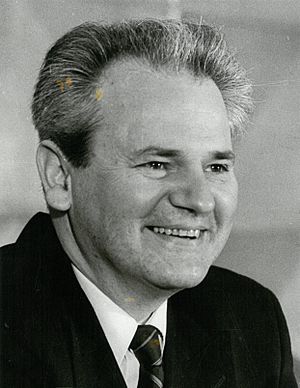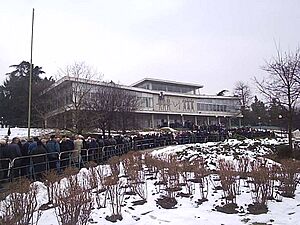Slobodan Milošević facts for kids
Quick facts for kids
Slobodan Milošević
|
|
|---|---|
|
Слободан Милошевић
|
|

Milošević in 1988
|
|
| 3rd President of the Federal Republic of Yugoslavia | |
| In office 23 July 1997 – 7 October 2000 |
|
| Prime Minister | |
| Preceded by | Srđa Božović (acting) |
| Succeeded by | Vojislav Koštunica |
| President of Serbia | |
| In office 11 January 1991 – 23 July 1997 |
|
| Prime Minister |
|
| Preceded by | Position established |
| Succeeded by | Dragan Tomić (acting) |
| 7th President of the Presidency of the Socialist Republic of Serbia | |
| In office 8 May 1989 – 11 January 1991 |
|
| Prime Minister |
|
| Preceded by | Ljubiša Igić (acting) |
| Succeeded by | Position abolished |
| 11th President of the League of Communists of Serbia | |
| In office 28 May 1986 – 8 May 1989 |
|
| Preceded by | Ivan Stambolić |
| Succeeded by | Bogdan Trifunović |
| Personal details | |
| Born | 20 August 1941 Požarevac, German-occupied Serbia |
| Died | 11 March 2006 (aged 64) The Hague, Netherlands |
| Resting place | Požarevac, Serbia |
| Nationality | Yugoslav (until 2003) |
| Political party |
|
| Spouse |
Mirjana Marković
(m. 1971) |
| Children | 2, including Marko |
| Parents |
|
| Relatives |
|
| Alma mater | University of Belgrade Faculty of Law |
| Signature |  |
| Nickname | "Sloba" |
| a. Became "President of the Presidency" of the Socialist Republic of Serbia (a constituent country of SFR Yugoslavia) on 8 May 1989. He was elected President of Serbia (still part of SFR Yugoslavia) at the first Presidential election in December 1990. After SFR Yugoslavia collapsed in March 1992, he continued as the President of the Republic of Serbia as a constituent of the newly formed FR Yugoslavia. | |
Slobodan Milošević (Serbo-Croatian Cyrillic: Слободан Милошевић; 20 August 1941 – 11 March 2006) was a politician from Serbia. He served as the president of Serbia and later as the president of the Federal Republic of Yugoslavia from 1997 to 2000. Milošević's political actions led to the breakup of the former country of Yugoslavia. These actions also caused Serbia to be involved in several conflicts with other countries in the Balkan region.
Milošević was accused of being responsible for some terrible events during the Bosnian War. He passed away in 2006 while on trial for serious international crimes at a special court in The Hague.
Contents
Early Life and Education
Slobodan Milošević was born in Požarevac, a town in Serbia. This was during World War II, when his country was occupied by Axis powers. He had an older brother named Borislav, who later became a diplomat. His parents separated after the war ended.
Milošević studied law at the University of Belgrade Faculty of Law. While he was a student, he joined the League of Socialist Youth of Yugoslavia.
Political Career and Leadership
In 1960, Milošević was a law student at the University of Belgrade. He was a very good student and was active in university groups.
He started his career in business in 1968. He eventually became the head of a state-owned gas company called Tehnogas. Later, he became the president of a big bank in Belgrade, Beobanka.
In 1987, Milošević gained public attention. He spoke out about issues in Kosovo, presenting himself as a protector of Serbs. This happened at a large rally in Kosovo Polje.
Milošević became the President of Serbia in 1989. He was re-elected in 1990 in the first elections with multiple political parties. During this time, the different parts of Yugoslavia began to separate. This led to the Yugoslav Wars. Serbia and Montenegro then formed a new country called the Federal Republic of Yugoslavia.
Milošević played a big part in these wars. He helped negotiate the Dayton Agreement, which ended the Bosnian War in 1995.
During his time as leader, many people protested against the government and the wars. It is thought that many people left the army or moved away from Serbia to avoid fighting.
From 1992 to 2001, Milošević led Serbia's Socialist Party. His policies focused on Serbian nationalism. These policies were a major reason for the breakup of Yugoslavia. They also led to Serbia being involved in conflicts with other new countries in the Balkans.
In 1997, Milošević became the President of the Federal Republic of Yugoslavia.
International Charges and Trial
In 1999, during the NATO bombing of Yugoslavia, Milošević was charged by an international court. This court was called the International Criminal Tribunal for the former Yugoslavia (ICTY). He was accused of serious international crimes related to the Bosnian War, the Croatian War of Independence, and the Kosovo War.
Milošević was arrested in 2001. He was then sent to The Hague in the Netherlands. There, he faced charges related to his actions during the conflicts.
At the start of his trial, Milošević said the court was not legal. Because of this, he refused to have a lawyer. He chose to defend himself during the five-year trial. The trial ended without a final decision because he passed away.
Death
Slobodan Milošević died in his prison cell in The Hague on 11 March 2006. He had heart problems and high blood pressure. He died from a heart attack. His death happened soon after the court denied his request to get special medical care in Russia.
He was not given a state funeral by the government. Instead, his friends and family held a private funeral for him in his hometown of Požarevac. Tens of thousands of his supporters attended a farewell ceremony in Belgrade before the funeral.
Aftermath and Public Opinion
After Milošević's death, the ICTY and another court, the International Residual Mechanism for Criminal Tribunals, looked into his actions. They found that he was part of a plan that used violence. This plan aimed to remove certain ethnic groups from parts of Croatia, Bosnia and Herzegovina, and Kosovo.
However, the International Court of Justice (ICJ) later stated that there was no direct proof linking Milošević to the most severe crimes committed by Bosnian Serb forces during the Bosnian War. But the court did find that Milošević and others in Serbia did not do enough to stop these crimes. They also did not cooperate with the international court in punishing those responsible.
Milošević's time as leader has been described as very controlling. There were many accusations of unfair elections and limits on news freedom.
Before his death, a survey in Serbia showed that Milošević was still a popular politician. In 2007, the International Court of Justice said that Serbia, under Milošević, was not directly responsible for the crimes during the Bosnian War. However, the court's president did say that it was "conclusively proved" that Milošević and other Serbian leaders "were fully aware" that terrible events were likely to happen.
In 2016, another court found that there was not enough evidence to say Milošević fully agreed with a plan to remove non-Serbs from certain areas. But it also noted that he did provide help, like people and weapons, to Bosnian Serbs during the conflict.
In 2010, Life magazine included Milošević on a list of "The World's Worst Dictators." He is still a debated figure in Serbia and the Balkans. This is because of the wars and accusations of him misusing his power.
Interesting Facts About Slobodan Milošević
- Milošević's family came from a village called Lijeva Rijeka in Podgorica, Montenegro. They belonged to the Vasojevići clan.
- In 1999, he became the first leader of a country to be charged with serious international crimes while still in office.
Images for kids
-
Milošević signing the Dayton Accords in 1995. This agreement officially ended the Bosnian War.
-
Milošević meeting with US President Bill Clinton in Paris on 14 December 1995.
See also
 In Spanish: Slobodan Milošević para niños
In Spanish: Slobodan Milošević para niños
- Propaganda during the Yugoslav Wars
- Serbia in the Yugoslav Wars
- Sanctions against Yugoslavia
 | James B. Knighten |
 | Azellia White |
 | Willa Brown |







